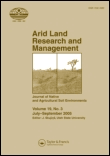
ARID LAND RESEARCH AND MANAGEMENT
Scope & Guideline
Transforming arid landscapes through innovative research.
Introduction
Aims and Scopes
- Ecological Studies in Arid Regions:
Research focusing on the ecology of arid and semi-arid ecosystems, including vegetation dynamics, soil properties, and biodiversity assessments. - Water Management and Conservation:
Studies that explore innovative techniques for water conservation, irrigation practices, and the impact of water scarcity on agricultural productivity. - Soil Health and Fertility Management:
Investigations into soil characteristics, amendments (like biochar), and management practices that enhance soil fertility and sustainability in arid lands. - Impact of Climate Change:
Research examining the effects of climate change on arid ecosystems, including shifts in vegetation, soil moisture, and land use. - Sustainable Agricultural Practices:
Studies evaluating crop responses to stress factors (salinity, drought) and the effectiveness of sustainable agricultural practices in improving yields. - Land Degradation and Restoration:
Research focused on understanding land degradation processes, their impacts, and strategies for land restoration in arid environments. - Innovative Technology Applications:
Utilization of advanced technologies (e.g., remote sensing, machine learning) for monitoring and managing arid landscapes.
Trending and Emerging
- Climate Resilience Strategies:
There is a growing emphasis on developing strategies that enhance the resilience of ecosystems and agricultural practices to climate variability and extreme weather events. - Utilization of Biotechnologies:
Emerging research is increasingly focused on biotechnological applications, such as the use of plant growth-promoting rhizobacteria and biocontrol agents to improve crop resilience. - Integrated Water Resource Management:
An increased focus on integrated approaches to water resource management, combining traditional knowledge with modern technology to optimize water use in agriculture. - Remote Sensing and GIS Applications:
The application of remote sensing and GIS technologies for monitoring land use changes, soil properties, and vegetation dynamics is on the rise, reflecting advancements in data collection and analysis. - Agroecology and Sustainable Practices:
Research is trending towards agroecological practices that promote biodiversity, soil health, and sustainable land use, indicating a shift from conventional agricultural methods. - Soil Microbial Communities and Health:
An emerging interest in the role of soil microbial communities in enhancing soil health and resilience is evident, reflecting a broader understanding of ecosystem functions.
Declining or Waning
- Traditional Land Use Practices:
Research on conventional land use practices in arid regions seems to be declining as the focus shifts towards innovative and sustainable practices that address contemporary challenges. - Single Crop Studies:
There is a noticeable decrease in studies focusing solely on single crop species, as current trends favor multi-crop systems and agroecological approaches that enhance resilience. - Basic Soil Chemistry Studies:
Basic investigations into soil chemistry are becoming less frequent, with a growing emphasis on integrated studies that also consider biological and ecological interactions. - Historical Land Use Impact Studies:
Research examining historical impacts of land use is waning, likely due to a pivot towards more actionable and forward-looking studies that address current and future challenges.
Similar Journals

Crop Forage & Turfgrass Management
Enhancing agronomy through cutting-edge research.Crop Forage & Turfgrass Management, published by WILEY, serves as an essential platform for researchers, professionals, and students in the fields of agronomy, crop science, plant science, and soil science. With a focus on advancing knowledge in the management of crops, forage systems, and turfgrass, this journal plays a pivotal role in disseminating innovative research and practical applications that drive agricultural sustainability and productivity. Despite its Q3 ranking in various agricultural and biological science categories according to Scopus, it aims to enhance its impact and relevance in the academic community through high-quality publications. As a journal converged from 2015 to 2024, it invites contributions that address contemporary challenges and solutions in crop management, ensuring accessibility to vital knowledge for the advancement of agricultural practices. Situated in the United States, it also reflects the diverse agricultural landscapes and practices of the region, making it a valuable resource for a global audience.

Carpathian Journal of Earth and Environmental Sciences
Championing High-Quality Research in Earth SciencesCarpathian Journal of Earth and Environmental Sciences is a distinguished academic journal dedicated to advancing the interdisciplinary field of Earth and environmental sciences. Published by the Carpathian Association for Environment and Earth Sciences, this journal plays a pivotal role in disseminating high-quality research focused on the dynamic interactions between geological processes and environmental changes. With an ISSN of 1842-4090 and an E-ISSN of 1844-489X, the journal is indexed in Scopus and holds an esteemed Q3 quartile ranking in both Earth and Planetary Sciences and Environmental Science categories as of 2023. Since its inception in 2008, the Carpathian Journal has provided an open access platform for researchers, professionals, and students to share insights, foster collaboration, and engage in critical discussions on pressing environmental issues. By continuously contributing to the body of knowledge in this field, the journal not only enhances academic discourse but also promotes sustainable environmental practices across Romania and beyond.
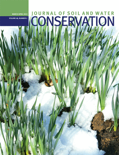
JOURNAL OF SOIL AND WATER CONSERVATION
Empowering research for resilient ecosystems.The JOURNAL OF SOIL AND WATER CONSERVATION, published by the Soil Water Conservation Society, is a leading peer-reviewed journal dedicated to the critical fields of agronomy, soil science, and water conservation. With its inception in 1973 and a convergence period extending to 2024, the journal plays a pivotal role in disseminating innovative research, management practices, and policy analysis aimed at promoting sustainable land and water resource management. The journal boasts an impressive Impact Factor and ranks in the Q1 and Q2 quartiles across key categories, including Agronomy and Crop Science, Nature and Landscape Conservation, and Water Science and Technology. It serves as an essential platform for researchers, professionals, and students to engage with cutting-edge findings that address pressing environmental challenges. Through its commitment to advancing the science of soil and water conservation, this journal remains a vital resource for enhancing ecological integrity and promoting sustainable agricultural practices.
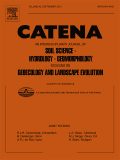
CATENA
Connecting Scholars to Transform Earth-Surface UnderstandingCATENA is a distinguished academic journal published by Elsevier, focusing on the critical field of Earth-Surface Processes. With a solid foundation established in 1973, CATENA has continuously evolved, offering a platform for high-impact research and groundbreaking discoveries in geosciences. The journal holds an impressive Scopus rank of #8 out of 179 in its category, placing it in the top 5% of its field, which underscores its importance and influence among researchers and practitioners alike. While CATENA does not operate under an open access model, its commitment to disseminating essential findings is evident in its rigorous peer-review process and inclusion of diverse studies. Located in the Netherlands, CATENA not only serves as an essential resource for professionals and students but also contributes valuable insights that help address global environmental challenges.
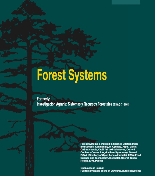
Forest Systems
Advancing ecological knowledge for sustainable forest futures.Forest Systems, an esteemed open-access journal published by CONSEJO SUPERIOR INVESTIGACIONES CIENTIFICAS-CSIC in Spain, has been a dedicated platform for advancing knowledge in the fields of ecology, forestry, and soil science since its inception in 1991. With an ISSN of 2171-5068 and E-ISSN 2171-9845, the journal is committed to disseminating high-quality research that addresses critical issues related to forest ecosystems and their management. Forest Systems is positioned within the Q4 category in Ecology, Evolution, Behavior and Systematics, and Q3 in both Forestry and Soil Science, evidencing its growing influence and relevance in these disciplines. Researchers will find a rich repository of articles that not only contribute significantly to academic discourse but also foster practical solutions to contemporary environmental challenges. As it converges from 2010 to 2024, the journal aims to enhance its outreach and impact, facilitating access for professionals, students, and policymakers committed to sustainable forest management and ecological conservation.
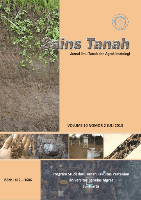
SAINS TANAH
Advancing Agronomy Through Open Access ResearchSAINS TANAH is a renowned peer-reviewed journal that focuses on the fields of agronomy, soil science, and environmental studies, published by Universitas Sebelas Maret Surakarta in Indonesia. Established as an Open Access platform since 2001, it aims to disseminate high-quality research that addresses critical issues in soil health, crop management, and pollution, thereby fostering sustainable agricultural practices. With its current impact factor demonstrating a Category Quartile ranking of Q3 and Q4 in major areas such as Agronomy and Crop Science, Atmospheric Science, and Pollution, SAINS TANAH serves as an essential resource for researchers, professionals, and students dedicated to advancing knowledge and solutions in these vital fields. By providing a collaborative environment and upholding rigorous academic standards, the journal not only highlights the significance of Indonesian research contributions but also aims to connect local insights with global agricultural and environmental challenges.

Revista Caatinga
Advancing Science, Enriching CommunitiesRevista Caatinga is a premier open-access journal published by Universidade Federal Rural do Semi-Árido (UFERSA), dedicated to the dissemination of significant research within the field of Agricultural and Biological Sciences. Since its inception in 2006, the journal has aimed to bridge the knowledge gap in various aspects of agricultural practices and biological phenomena, making vital contributions to the scientific community. With its publications indexed in Scopus and holding an impressive Q2 categorization in the competitive landscape of agricultural sciences, the journal ranks within the top half of its category (100/221), demonstrating a commitment to quality scholarship. The journal is based in Brazil and covers a wide array of topics relevant to both local and global agricultural challenges. By fostering open access, Revista Caatinga ensures that vital research is available to a broad audience, promoting knowledge sharing and collaboration among researchers, practitioners, and students around the world.
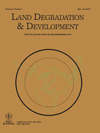
LAND DEGRADATION & DEVELOPMENT
Fostering interdisciplinary insights for sustainable land management.LAND DEGRADATION & DEVELOPMENT is a premier academic journal published by WILEY that has been at the forefront of research on the critical issues surrounding land degradation since its inception in 1989. With an impressive impact factor and ranked in the Q1 category across multiple fields including Development, Environmental Chemistry, Environmental Science, and Soil Science, this journal serves as an essential resource for scholars and professionals dedicated to sustainable land management and environmental conservation. Although it currently does not provide open access, its rigorous peer-review process ensures the publication of high-quality, impactful research that addresses vital environmental challenges. The journal aims to foster interdisciplinary collaboration, promote innovative solutions, and disseminate knowledge that not only informs policy but also empowers communities to combat land degradation effectively. Researchers, professionals, and students alike will find the insights and findings published in LAND DEGRADATION & DEVELOPMENT invaluable for advancing their understanding and practices within this critical field.

EURASIAN SOIL SCIENCE
Advancing soil science for a sustainable future.EURASIAN SOIL SCIENCE, published by PLEIADES PUBLISHING INC, is a premier journal dedicated to advancing knowledge in the fields of soil science and earth-surface processes. With an ISSN of 1064-2293 and an E-ISSN of 1556-195X, this journal has been a key resource for researchers and professionals from its inception in 1992 and continues to thrive as it converges toward 2024. Situated in the United States, EURASIAN SOIL SCIENCE has achieved notable recognition, attaining a Q2 ranking in both Earth-Surface Processes and Soil Science categories as of 2023. Its Scopus rankings further underscore its importance, with Earth and Planetary Sciences placing it at #81/179 and Agricultural and Biological Sciences ranking it at #80/159. Engaging a global audience, this journal publishes cutting-edge research articles, reviews, and case studies that address critical issues related to soil health, conservation, and management. Though currently not open access, the journal offers valuable insights and fosters collaboration among scientists and practitioners, underscoring its vital role in enhancing the understanding of soil dynamics and sustainability.
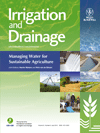
IRRIGATION AND DRAINAGE
Innovating irrigation practices for a resilient future.IRRIGATION AND DRAINAGE, published by Wiley, is a prestigious academic journal that focuses on the critical fields of agronomy, crop science, and soil science. With an ISSN of 1531-0353 and an E-ISSN of 1531-0361, this journal serves as an essential platform for disseminating innovative research and insights relevant to the management of irrigation systems and drainage in agricultural practices. Based in the United Kingdom, the journal has shown a significant impact in its field, boasting a 2023 ranking in the Q2 quartile for both Agronomy and Crop Science and Soil Science. It ranks #149 out of 406 in Agricultural and Biological Sciences for Agronomy and Crop Science, and #66 out of 159 in Soil Science, placing it within the 58th to 63rd percentiles. This journal not only aims to advance knowledge in the sustainable management of water resources and soil health but also encourages open access to its content, making significant findings more accessible to researchers, professionals, and students alike. As it approaches its convergence period from 2001 to 2024, the importance of IRRIGATION AND DRAINAGE in shaping effective agricultural strategies continues to grow, fostering dialogue and innovation among its readership.